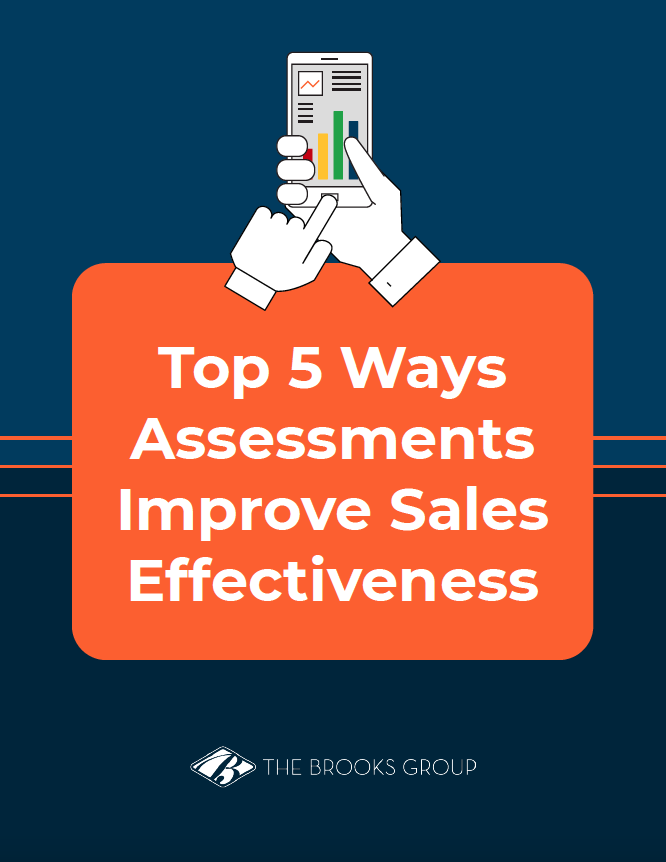Hiring assessments aren’t used by every organization, but they should be. When you bring a new sales professional into your team, you are investing time and money in them in the hope that they’ll help your company generate more revenue.
Unfortunately, that isn’t always the case.
But there’s a way to find out whether a seller might not be the best fit before hiring them. Using a sales assessment to evaluate candidates can greatly reduce the chance of hiring an individual who may hurt your team and the overall performance of your company.
Find out why incorporating a sales hiring assessment into your recruiting and onboarding process is absolutely worth your while.
What Is a Hiring Assessment?
Hiring assessments such as The Brooks Group’s Brooks Talent Index™ are designed to evaluate a sales candidate’s skills, abilities, and personality traits that are crucial for success. These assessments can take various forms, including:
1. Sales Aptitude Tests
These tests measure a candidate’s natural inclination and potential for success in sales roles. They typically assess traits such as persuasiveness, resilience, competitiveness, and problem-solving abilities. These tests can provide insights into a candidate’s ability to handle rejection, build rapport, and close deals effectively.
2. Sales Skill Assessments
These assessments evaluate a candidate’s practical sales skills, such as product knowledge, prospecting techniques, objection handling, and negotiation skills. They may include role-playing exercises, simulations, or case studies that mimic real-life sales scenarios. Selling skills assessments help gauge a candidate’s ability to apply sales strategies and techniques effectively.
3. Personality Assessments
Many companies use personality assessments to evaluate a candidate’s fit with the company’s culture and sales team dynamics. Emotional quotient assessments measure traits like extraversion, assertiveness, empathy, and stress tolerance, which are essential for successful sales professionals.
4. Work Sample Tests
In these assessments, candidates are asked to complete tasks or projects that are directly related to the sales role they are applying for. For example, they may be asked to prepare a sales pitch, conduct a mock sales call, or analyze sales data and present their findings. These tests provide a realistic preview of the job’s responsibilities and allow candidates to demonstrate their sales abilities in a controlled environment.
5. Structured Interviews
Structured interviews are a common component of sales hiring assessments. They involve a standardized set of questions designed to evaluate a candidate’s sales experience, communication skills, goal-setting abilities, and motivation. They often include behavior-based questions that ask candidates to describe how they handled specific sales situations.
The most effective hiring assessments for sales roles are comprehensive and assess a combination of skills, behaviors, motivators, and competencies. The aim is to ensure that candidates possess the necessary skills, traits, and mindset to succeed in a demanding and competitive sales environment.
Learn more about the Brooks Talent Index™ comprehensive sales assessment.
Why Hiring Assessments Are Worth It
Using sales hiring assessments is worth the time and expense for several reasons.
1. Improved Hiring Decisions
Assessments provide objective data and insights into a candidate’s skills, abilities, and personality traits that are difficult to gauge through interviews alone. This information can help organizations make more informed and accurate hiring decisions, reducing the risk of costly mis-hires.
2. Better Fit for the Role
Assessments help identify candidates who are a good fit for a specific sales role and company culture. This increases the likelihood of hiring individuals who will be productive, engaged, and successful in the role, leading to higher job satisfaction and retention rates.
3. Predicting Job Performance
Many assessments are designed to predict a candidate’s potential job performance based on their scores or ratings. By identifying top-performing candidates, organizations can build a stronger, more effective sales team capable of achieving or exceeding sales targets.
4. Identifying Training Needs
Assessments can reveal areas where candidates may need additional sales training or development. This information can be used to create personalized training plans, ensuring that new hires are equipped with the necessary knowledge and skills to succeed from the start.
5. Competitive Advantage
In a competitive job market, organizations that use comprehensive hiring assessments can gain an edge in attracting and selecting top sales talent. Candidates often perceive these assessments as a sign of a professional and thorough hiring process, enhancing the company’s reputation and employer brand.
6. Legal Compliance
Many assessments are designed to be fair, unbiased, and compliant with employment laws and regulations. Using validated and legally defensible assessments can help organizations mitigate the risk of discrimination claims during the hiring process.
While hiring assessments require an investment of time and resources, the potential benefits of improved hiring decisions, better job fit, increased productivity, and reduced turnover can outweigh the costs, especially in sales roles where the impact of high-performing individuals is significant.
Use Hiring Assessments to Understand Each Sales Candidate Better
The best hiring assessments provide a validated, data-backed tool to understand each candidate in a more comprehensive way. While interview questions can give you an entry-level understanding of a person and help determine if the person will mesh well with the team and the company, there are many other factors that ultimately determine if they can succeed.
With a hiring assessment, you can get a better understanding of the areas in which they thrive and which areas are weaknesses for them. With this analysis, you can have a better idea of whether or not an individual is going to be a good fit for your selling environment.
Aside from being able to understand a potential seller’s motivators and competencies, a structured sales hiring assessment can provide you with an idea of their work pace. Whether you’re hiring for a position that is constantly on the go or you’re looking for an individual who is thorough and pays attention to detail, having them complete a hiring assessment will provide you with insight into how they’ll perform on the job.
An interview is, and has been, where most people decide whether or not an individual is fit for the job. While the interview can say a lot about someone’s personal skills, it doesn’t tell you much about their level of performance.
Lastly, a hiring assessment gives candidates a way to shine. With this additional information, you don’t have to worry that you may have missed a fantastic individual because of a lackluster interview. Based on the assessment, you can be confident you’ve chosen a great new addition to your sales team.
Leverage Sales Assessments to Improve Your Hiring Process
Discover how The Brooks Group sales assessments can help you hire, train, coach, and retain high-performing sales professionals.
White Paper Download
Top 5 Ways Assessments Improve Sales Effectiveness
Do you know what really motivates your sellers to perform? Assessments are a powerful tool sales leaders can use to understand to hire smarter, coach effectively, retain top performers and ultimately improve sales effectiveness and performance. This guide outlines the top 5 ways you can use assessments to improve sales effectiveness.





